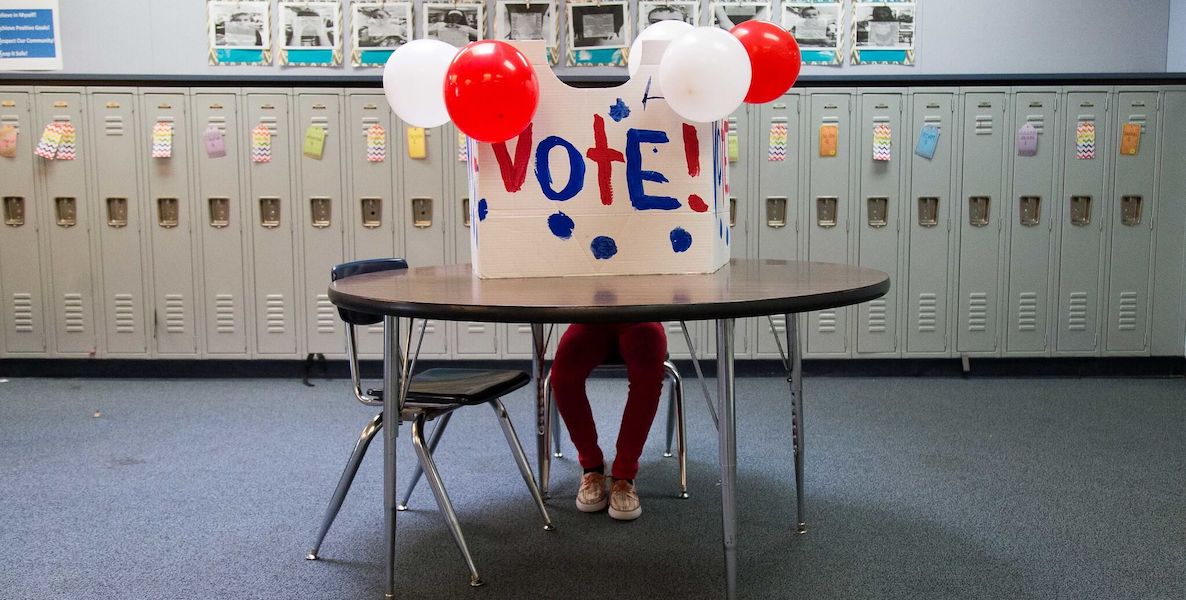As a 17-year-old, it feels like there is a lot you can’t do. You can’t adopt a pet, go skydiving, or become a member at Costco (teens love Kirkland too!). But the most important thing you can’t yet do at age 17 is … vote. Still, while a 17-year-old can’t vote, there are many things they can do to stay involved with our civic process. One of those things is becoming a poll worker.
Poll workers are the employees — paid by the City — who run the operations at your polling places. They are responsible for checking in voters, managing the machines, and ensuring that everything runs smoothly and securely.
In Philadelphia, if you are 17 years old and enrolled in high school, you are eligible to sign up. And in fact, Philadelphia, along with many other places in the country, is facing a shortage of poll workers (the state employs 45,000 across 9,000 voting locations). If you have been on the fence about signing up, now is a great time to do so.
The poll worker application form requires much less information than when you are going to register to vote.
Here’s what my experience looked like serving as a poll worker in Philadelphia (during the 2022 General Election):
-
- When the middle of August rolled around, I searched “poll worker Philadelphia” and headed to this link on the Philadelphia City Commissioners website.
- To sign up, I filled out my name, address, and contact information on the form. Note: This form requires much less information than when you are going to register to vote.
- A few minutes later, I received a confirmation email from the City of Philadelphia thanking me for indicating my interest in serving as a poll worker.
- Two weeks after signing up, the City emailed me again with information on how to complete my training for the upcoming election. The email stressed that the training was optional, but if I chose to complete it, I would make an additional $50.
- Since I had no clue what to expect, I decided that I should complete the training. Of the two options, either in-person or virtual, I chose the virtual training, which aligned better with my school schedule.
- The training was easy to follow — it included a video as well as a quiz to check my understanding — and, by the end, I felt as though I had the hang of what I was supposed to do come Election Day.
- After completing the training, which I did at the end of September, I waited for my Election Day assignment. I waited and waited and waited, hearing nothing from the City.
- Finally, the day before Election Day, when I had still not received an assignment, I decided to call the Philadelphia City Commissioners’ Office. A quick Google Search yielded the best phone number — (215) 685-4811, for the Election Board Unit. A friendly woman answered the phone. I explained my situation: I had signed up to work the polls, and completed the training, but hadn’t received an assignment. She told me that there were no positions left near my home in Center City, but there were a few assignments in Northeast Philadelphia. After telling her that I was happy to go wherever, I was assigned to 66-10 (Ward 66, division 10). Aha! Success! (To note: I received no confirmation email about my new assignment. In hindsight, probably not a great sign.)
- My Election Day morning began bright and early at 5:15am so I could arrive at my polling place near the Northeast Philadelphia Airport around 6:15am. I hit the road, blasting some music to keep me awake; so far, all was going well!
- I arrived at my polling place — or at least the address that the person told me to head to on the phone — and met a surprise: The parking lot was empty. I waited for a few minutes, trying the doors of the building — all locked — before wandering behind the building. There, I found my polling place, an airplane hangar in the back parking lot. (I’ve got to admit, the array of airplanes and helicopters in the hangar made up for the fact that I took a good 15 minutes to find where I was supposed to go.)
- Once I entered the hangar, I headed to the table labeled 66-10 and introduced myself to the woman at the table, explaining that I was supposed to serve as her clerk for the day. She told me that I must have been mistaken: Her slate of poll workers had been filled for weeks and I wasn’t needed. The start of my poll-working career wasn’t looking too hot at this point …
- I began to walk out of the hangar towards my car — figuring that I wouldn’t be working the polls that day — when the Judge of Elections from 57-27 (another ward at the same polling place), came running up and told me that they could use my help at her table. Just like that, I had a job again!
- I spent the rest of the day checking in voters and assisting with the machines. It went extremely smoothly and was surprisingly fun. My new supervisor and the rest of the election board (there were four of us in total) answered all my questions and offered an endless supply of peanut butter crackers, soft pretzels, and witty jokes. This group was the highlight of my experience. They rocked!
- Nearly 13 hours later, and at this point, I’ll admit I was pretty tired, the ballot hoppers had been handed off to a police officer, and I was free to go. My supervisor made me promise that I’d come back to join them in May; I told her yes. She told me that she’d be in touch.
- The next morning, sure enough, I had a text message from Helen thanking me for spending the day with them — a great way to start my Wednesday.
- On December 22, my check for $250 arrived in the mail. (I forgot to note on the pay stub at the end of the night that I had completed the training. Nevertheless, the City had linked my training account with my profile and paid me anyway. I found that to be impressive).
Addendum: Without access to a car, I doubt I would have been able to take the clerk job so far from my house. Looking at options via public transport, it would take an hour and 20 minutes and would require two transfers. (All before 6am … )
Time spent: 5 minutes to sign up, 5 minutes on the phone, 13.5 hours working the polls.
Result: After a few hiccups, I happily served as a poll worker.
Takeaway: Throughout my process of signing up and then working as a poll worker, there were lots of hits, and lots of misses.
The signup and training were efficient. But the City’s failure to assign me a polling place, then giving me the wrong information, is a travesty. I thought we were desperate for poll workers, no?
In the end, though, I learned a lot, helped the election run smoothly, and was able to meet a kind, dedicated, and genuine group of Philadelphians who cared about helping their fellow citizens exercise their right to vote. Plus, the $250 check didn’t hurt, either!
If you are considering stepping up and serving as a poll worker, I say go for it. But be prepared: You’ll be sure to encounter some bumps along the way.
Lighting bolt rating out of 5:![]()
![]()
![]() (two-and-a-half bolts out of five)
(two-and-a-half bolts out of five)
 Lead support for Every Voice, Every Vote is provided by the William Penn Foundation, with additional funding from The Lenfest Institute, Peter and Judy Leone, the John S. and James L. Knight Foundation, Harriet and Larry Weiss, and the Wyncote Foundation, among others.
Lead support for Every Voice, Every Vote is provided by the William Penn Foundation, with additional funding from The Lenfest Institute, Peter and Judy Leone, the John S. and James L. Knight Foundation, Harriet and Larry Weiss, and the Wyncote Foundation, among others.
![]() MORE ON OUR ELECTIONS FROM THE CITIZEN
MORE ON OUR ELECTIONS FROM THE CITIZEN
Header photo by Phil Roeder / Flickr



